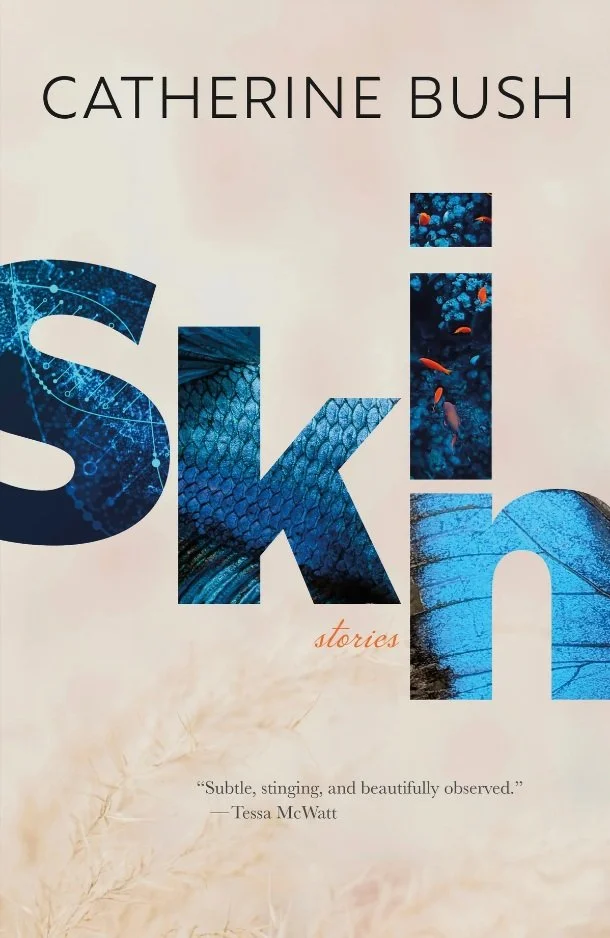Barrelhouse Reviews: Skin by Catherine Bush
Reviewed by Alex Gurtis
Goose Lane Editions / April 2025 / 226 pp
Catherine Bush, who has published several novels to date including Minus Time and the critically acclaimed Blaze Island, has a reputation as one of Canada’s finest contemporary novelists. With this new work, she has changed course. Skin, her first collection of short fiction, explores intimacy and how humans find connection in a world where being vulnerable could come at a steep cost. Bush’s writing style in Skin is lush and aesthetically casts a wide net.
The stories in Skin range from the brilliant opening novella, “Benevolence: An East Village Story,” which could be its own standalone book, to flash-length fiction set in genres as wide-ranging as contemporary slice of life, speculative climate fiction, and Regency-era romance. Bush links these spheres with an unflinching lens trained on intimacy, both romantic and platonic, built on and the fragility of human experience. To be influential, one must be willing to be influenced, a truism which speaks to the vulnerability and exchange that comes with relationships. Yet, in entering a willing exchange of emotions with another person, these characters find moments of tenderness and transformation within a framework of fear and consequence.
One of the most successful stories in the collection is the titular “Skin,” a short narrative about an unknown narrator’s divorced evangelist mother, who flew to Tanzania on a mission trip in their youth. There, as part of her missionary work, she washed feet as a form of baptism. As “children, [the mother] never kissed us as she put us to bed. She unkinked our toes.” Later, when asked about this peculiarity, the mother makes a shocking admission: her feet are the most erotic and sensitive part of her body, and she can’t orgasm without the gentle brushing of her left metatarsal arch. The story ends with the mother coming to the narrator’s dying father’s bedside, despite their separation. He calls for her in a delirious state and she responds by grabbing his ankles, brushing his feet with a sponge as he cries out. This charged image epitomizes the quiet, internal emotional landscapes these characters inhabit and the almost poetic force with which Bush delivers their stories.
At times, Bush’s collection processes emotional turmoil through characters working in science, such as Agnes, an “experimental psychologist,” and Hugh Robson, a conservation biologist. In “Camouflage,” Agnes notes to Danny, busy processing his unproclaimed feelings for his friend Ethan, that “Human beings are covered in approximately two square meters of skin. . .[that] teems with nerve fibers. . .that exist primarily to register. . .Touch.” This occasional lean into the science world grounds the book and keeps the stories from running solely on emotion. Bush engages meaningfully with why, rationally, we crave and desire. Human need for connection is coded into our DNA.
While she focuses largely on human-to-human connection, Bush also includes a few works that ask the reader to consider how intimacy with nature and the world around us might take shape. Her ideas in this realm include falling in love with the chaotic nature of the wind or shedding one’s skin to dive into glacial water. The body, like the natural world, is a type of environment that provides a sense of place.
There is a reason Bush’s book was released on Earth Day. How we connect with the world around us teaches us how we can connect with people. Skin offers insight into how we can fight loneliness: nature, but also other people. Bush’s characters are flawed but filled with a raw desire to be acknowledged and seen. This is a book for those who enjoy stories about human bonding and want a range of stories to dig into.
Alex Gurtis is the author of the chapbook When the Ocean Comes to Me (Bottlecap Press, 2024). His work has appeared or is forthcoming in several anthologies and journals including Aquifer: The Florida Review Online, Barrelhouse, HAD, Rain Taxi, West Trade Review, and others. A ruth weiss Foundation Maverick Poet Award Finalist, Alex received his MFA from the University of Central Florida.

